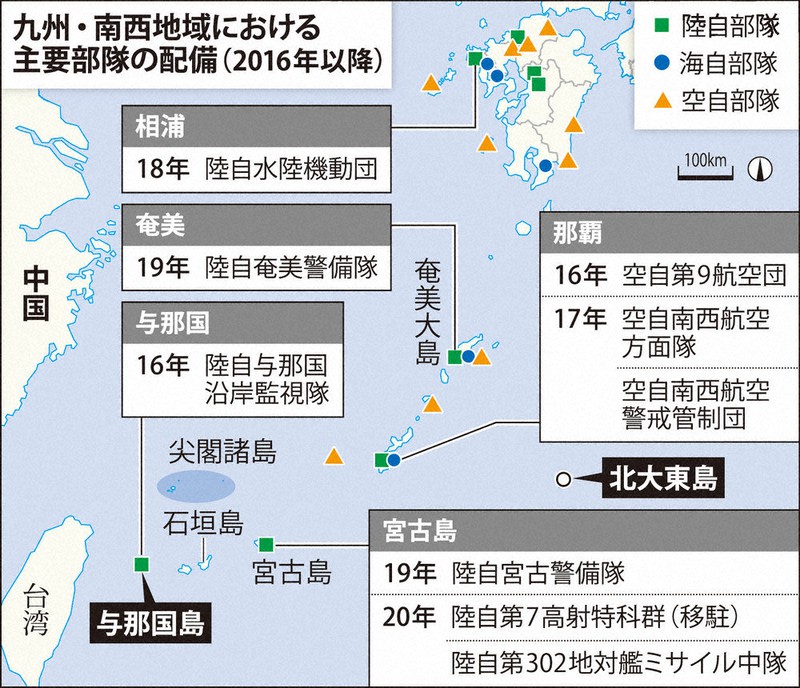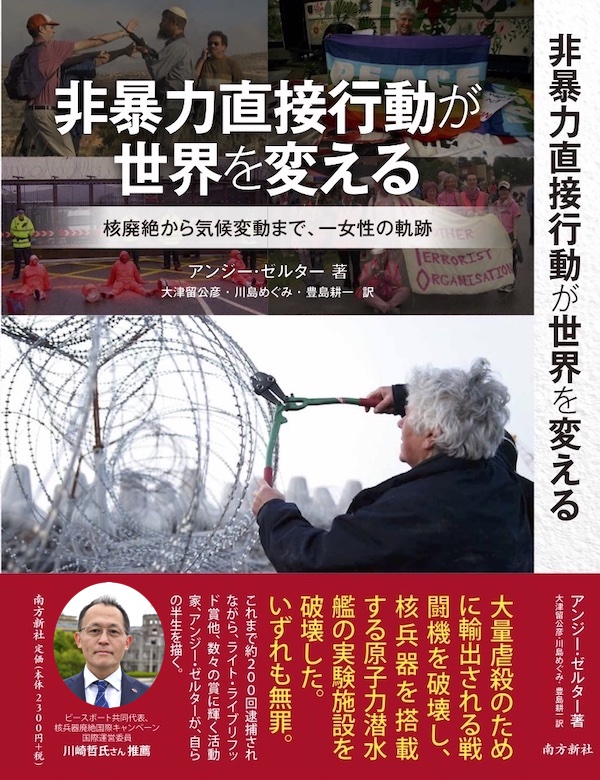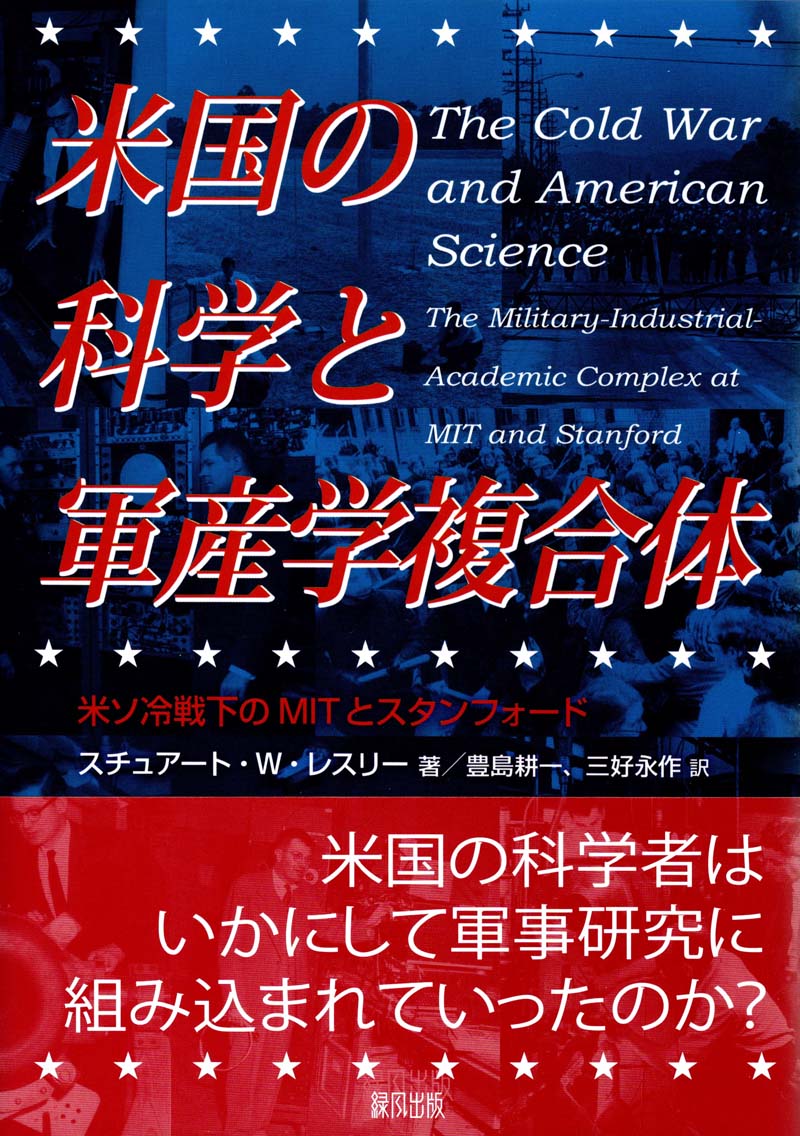Does China Invade the Ryukyu archipelago? (English version of the former posting) [反核・平和]
(This is an English version of the essay posted on Sept. 6)
Does China Invade the Ryukyu archipelago?
- A Memorandum for Peace -...
 1. Introduction
1. Introduction
As I am not an expert on international politics or military issues, my comments on military tensions in East Asia will be taken no more seriously than the remarks of a TV personality on a wide-ranging TV show, but I write this as a reminder to myself - as a 'web log'. However, what follows is completely within the scope of general knowledge and common sense, and does not require any particular expertise. Rather, I would like to show that even a layperson can make this level of argument - which is even contrary to the mainstream discourse found in the mass media. This essay was inspired by the lecture given by Mr. Motofumi Asai, which I introduced in the previous post. If there are any mistakes, I would be very grateful if you could point them out in the comments section or elsewhere. (The table on the right is taken from a May 2, 2022 article in the Mainichi Newspaper.)
2. Why is Japan involved in the "Taiwan contingency"?
According to media reports, Taro Aso, vice president of the Liberal Democratic Party (LDP), referring to the Taiwan "contingency," said, "If a war were to start in Okinawa, Yonaguni Island, or Yoron Island, the situation would be such that it could not be said to be outside the combat zone, and it is quite possible that a war could break out." He also stressed "determination to protect our own country by ourselves". (Asahi, 2 Sep.)
Given the impression of recent military tensions between China, Taiwan, and the U.S., as well as China's reported military buildup and base expansion, and Russia's invasion of Ukraine, many people might think that this might be the case. However, one wonders why war would break out within Japan - in this case, presumably referring to the Nansei Islands. Perhaps they are thinking of a military conflict between China and Taiwan over the unification/independence of Taiwan, which would escalate into war, with the U.S. and Japan getting involved. If, instead, we have to consider the possibility of China suddenly invading the Nansei Islands, much less the Japanese mainland, regardless of Sino-Taiwanese relations, we would naturally have to assume that Japan would suddenly invade the Korean Peninsula or China (as it did in the past), and so on. This is because when it comes to security issues, there are no measures that are absolutely safe and no events that absolutely do not require vigilance; it is all a comparative matter of which is more probable.
Why, then, would Japan be involved in a military conflict between China and Taiwan? The only reason is that Japan is prepared to intervene in this conflict, or rather, is willing (or rather brainwashed) to follow the US in this conflict. Instead of Japan intervening in the conflict from the front, the Self-Defense Forces may join in behind the U.S. war, or perhaps even go the other way and let Japan fight the war while the U.S. watches from behind. Of course, Japan provides bases to the U.S., especially in Okinawa, and the military alliance with the U.S. means that the SDF is effectively under the command of the U.S. military, so in the event of war, these Japanese and U.S. bases would naturally become targets of attack by the other side.
3. The "Taiwan War" is essentially China's civil war
Now, in the first place, is there any reason why Japan and the U.S. should or must be involved in the Taiwan War, which is said to be a crisis?
Paragraphs 2 and 3 of the 1972 Japan-China Joint Statement[1] state that "The Government of Japan recognizes that the Government of the People's Republic of China is the sole legitimate government of China" and "The Government of the People's Republic of China reiterates that Taiwan is an integral part of the territory of the People's Republic of China." Article III of the 1978 Treaty of Peace and Friendship between China and Japan[2] states that the two countries shall "abide by the principles of equality and reciprocity and mutual non-interference in internal affairs". The U.S. has also adopted the "one China" position for now. In other words, if a Taiwan war were to break out, both the U.S. and Japan would have to admit that it would be a "civil war" and that they could not get involved in a civil war. The worst thing that could happen is for China to resort to force to "unify" Taiwan, but that does not mean that a foreign country can prevent this by force. This would be the same as the case of the forced annexation of Hong Kong not long ago, breaking the "one country, two systems" promise, in which no foreign country could intervene by military force.
4. Ignoring legal validity?
Despite these legal restrictions, not only politicians such as Aso's statement quoted at the beginning of this article, but also a group of scholars and experts who appear on TV talk as if Japan's participation or involvement in the Taiwan War is possible or unavoidable. However, I have not heard any discussion of the justification or legal basis for this from such commentators. (Perhaps they do somewhere, but I have yet to find it.) What one hears, however, is a discourse that treats such military tensions as if they were a natural phenomenon, and that takes for granted or does not explicitly oppose to the proposition of defense spending increase under the guise of a "worsening security environment.
For example, Yu Koizumi, a self-proclaimed expert on military issues, in a short comment[3] on the news that the Ministry of Defense had decided on a budget request for FY2023 (Nikkei, August 31), the largest ever, stated the following. I quote the first half of the article.Considering the recent security environment, I believe that an increase in defense spending is certainly unavoidable. Furthermore, Russia's invasion of Ukraine will force the U.S. military to shift a considerable amount of its deterrence resources to the European front, so Japan's role in ensuring the credibility of deterrence against China should be quite important.Here, "deterrence by U.S. forces" is assumed as a matter of course, and the logic is that Japan's natural role is to supplement it, but the original justification or basis for this is not discussed. According to an online survey of relevant international law, the only exceptions to the principle of prohibition of the use of force recognized by the UN Charter are (1) the urgent exercise of the right of individual or collective self-defense in the event of an armed attack, and (2) actions determined by the Security Council as measures against threats to peace, subversion, or acts of aggression [1]. The 1st is Article 51 of the UN Charter, and the 2nd is Article 42. However, Taiwan is not a member state with regard to (1), and (2) must await a decision by the Security Council. The UN Charter is naturally cited as the basis for condemning Russia's invasion, and perhaps Koizumi is no different, but does he think that the UN Charter does not matter in the case of the U.S. and other countries' intervention in the Sino-Taiwan war? Or is there some other legal basis?
Since Mr. Koizumi approves of further increases in "defense spending," he must not be opposed to the expansion of the Self-Defense Forces by turning the Nansei Islands into missile bases. But this will be necessary not in the war against Russia nor Korea (DPRK), but in the war against Taiwan. However, as mentioned above, Japan cannot be involved in the Taiwan War, either by treaty or by the UN Charter (of course, this is also true from the preamble and the Article 9 of the Constitution of Japan, but I have purposely excluded that here), so there is no way that Japan can be prepared for this war. (The figure on the right is from the May 2 2022 issue of Mainichi Shimbun.)
5. "Preparedness" is, on the contrary, a factor and pretext for the other party's military buildup
Even if the expansion of the Self-Defense Forces in the Nansei Islands is not specifically against China, but rather for general "deterrence enhancement,"[4] it is undeniably a threat from the perspective of neighboring countries, and through the mechanism of the well-known "security dilemma," it becomes a factor and even a justification for the expansion of other countries' military forces. In other words, the very idea of "deterrence" will invite war. China's military expansion may be large in speed and scale, while Japan's may be relatively small in comparison, but it should be seen as a military force that unites Japan and the U.S. because of the Security Treaty, and China naturally sees it that way. In reality, the SDF is subordinate to the U.S. military. Of course, there are many U.S. military bases in Japan, especially in Okinawa. I do not intend to say that we should wait until Chinese vessels start imitating the U.S. in their "freedom of navigation operations" through the Caribbean Sea.
I am not justifying Russia's invasion of Ukraine, but NATO's eastward expansion as well as Ukraine's military buildup just prior may have been a remote cause of it. It is probably well known that the former at least gave Putin an excuse. (Of course, it could also be argued that Ukraine's own military expansion was not enough to prevent the invasion. I don't even think anyone can "correctly" judge which is right.)
Although Taiwan is not a member of the United Nations, 14 countries have diplomatic relations with it and it participates in various international organizations, making it virtually an independent country. It would be totally unjust if China were to attempt to forcefully place such an area and its inhabitants under its control by force of arms. At the same time, foreign intervention may diminish, even cancel out, or even legitimize the injustice of the former. The excuse would be that it is an unavoidable measure "to prevent the division of the country by force." With a greater loss of life, of course.
The conclusion is that peace through military "deterrence" is unstable and merely a postponement of war. It is a well-known fact that military power is inseparable from industrial technology, and that technological competition is inevitable. In other words, the military balance is an ever-increasing "balance" of power, which must be unstable. The only way to prevent this is to make a deliberate effort to shift to a reduced balance, or to aim for the abolition of arms.
Let us recall a phrase from the preamble of the UNESCO Charter: "Since wars begin in the minds of men, it is in the minds of men that the defences of peace must be constructed"[5]. This is not spiritualism or idealism, but the only path to lasting peace. In other words, the world will not be peaceful unless there are more pacifists. The same is true for nations, and the most important thing is to increase the number of pacifist nations.
--------------
notes
[1] Joint Statement by the Government of Japan and the Government of the People's Republic of China
https://www.mofa.go.jp/mofaj/area/china/nc_seimei.html
[2] Treaty of Peace and Friendship between Japan and China
https://www.mofa.go.jp/mofaj/area/china/nc_heiwa.html
[3] https://www.nikkei.com/article/DGXZQOUA265VN0W2A820C2000000/#k-think
[4] For example, in Nikkei's September 4 article by Kazuto Suzuki, "Japan-U.S. 'Integrated Deterrence' Transformation: Strategies and Institutions for a Taiwan Contingency. The article states, "Correcting the imbalance of forces with China is an urgent task.
https://www.nikkei.com/article/DGXZQOUA199ZG0Z10C22A8000000/
[5] See, for example, the following page from the Ministry of Education.
https://www.mext.go.jp/unesco/009/001.htm
-----------
other postings in English
Former Self-Defense Force Officer Makoto Konishi's Opinion on the War in Ukraine, 2022-5-23
Russia's invasion of Ukraine / ロシアのウクライナ侵攻, 2022-2-24
ゴルゴ13 / Golgo 13, 2021-9-29
English version of the essay serialized in "Anti-war Bulletin": Japanese demonstrations in 'galapagosian' way allow continued tyranny, 2021-4-6
Kurume air raid two days after the Nagasaki atomic bomb, 2019-8-8
"Positive feedback" mechanism paralyzing our democracy, 2019-1-6
Peace Education in Math Classroom
Does China Invade the Ryukyu archipelago?
- A Memorandum for Peace -...
Summary
The possibility of a war in Japan triggered by the Taiwan "contingency" does not envision a sudden Chinese invasion of the Nansei Islands, but rather a counterattack (or a possible preventive attack) against the U.S. and Japan in whatever form they enter the Taiwan War, which is a cause for concern.
Based on the treaties and joint statements currently in effect between Japan and China, the Taiwan War is a civil war, and Japan cannot intervene in it without abrogating these treaties and statements. The same is true for the U.S., which is currently taking the "one China" position.
If it is a civil war, there is no basis in international law for military intervention in it. The major media talks about US intervention as if it were a matter of course, but I have not seen any discussion of the legal basis for such intervention.
The ongoing conversion of the Nansei Islands into missile bases is a preparation for such illegal military intervention, and the mechanism of the "security dilemma" will raise China's alarm and encourage its military buildup.
Peace through "deterrence" is unstable and merely a postponement of war. We should recall the preamble of the UNESCO Charter, which states "since wars begin in the minds of men, it is in the minds of men that the defences of peace must be constructed". This is neither spiritualism nor idealism, but the only path to lasting peace.
 1. Introduction
1. IntroductionAs I am not an expert on international politics or military issues, my comments on military tensions in East Asia will be taken no more seriously than the remarks of a TV personality on a wide-ranging TV show, but I write this as a reminder to myself - as a 'web log'. However, what follows is completely within the scope of general knowledge and common sense, and does not require any particular expertise. Rather, I would like to show that even a layperson can make this level of argument - which is even contrary to the mainstream discourse found in the mass media. This essay was inspired by the lecture given by Mr. Motofumi Asai, which I introduced in the previous post. If there are any mistakes, I would be very grateful if you could point them out in the comments section or elsewhere. (The table on the right is taken from a May 2, 2022 article in the Mainichi Newspaper.)
2. Why is Japan involved in the "Taiwan contingency"?
According to media reports, Taro Aso, vice president of the Liberal Democratic Party (LDP), referring to the Taiwan "contingency," said, "If a war were to start in Okinawa, Yonaguni Island, or Yoron Island, the situation would be such that it could not be said to be outside the combat zone, and it is quite possible that a war could break out." He also stressed "determination to protect our own country by ourselves". (Asahi, 2 Sep.)
Given the impression of recent military tensions between China, Taiwan, and the U.S., as well as China's reported military buildup and base expansion, and Russia's invasion of Ukraine, many people might think that this might be the case. However, one wonders why war would break out within Japan - in this case, presumably referring to the Nansei Islands. Perhaps they are thinking of a military conflict between China and Taiwan over the unification/independence of Taiwan, which would escalate into war, with the U.S. and Japan getting involved. If, instead, we have to consider the possibility of China suddenly invading the Nansei Islands, much less the Japanese mainland, regardless of Sino-Taiwanese relations, we would naturally have to assume that Japan would suddenly invade the Korean Peninsula or China (as it did in the past), and so on. This is because when it comes to security issues, there are no measures that are absolutely safe and no events that absolutely do not require vigilance; it is all a comparative matter of which is more probable.
Why, then, would Japan be involved in a military conflict between China and Taiwan? The only reason is that Japan is prepared to intervene in this conflict, or rather, is willing (or rather brainwashed) to follow the US in this conflict. Instead of Japan intervening in the conflict from the front, the Self-Defense Forces may join in behind the U.S. war, or perhaps even go the other way and let Japan fight the war while the U.S. watches from behind. Of course, Japan provides bases to the U.S., especially in Okinawa, and the military alliance with the U.S. means that the SDF is effectively under the command of the U.S. military, so in the event of war, these Japanese and U.S. bases would naturally become targets of attack by the other side.
3. The "Taiwan War" is essentially China's civil war
Now, in the first place, is there any reason why Japan and the U.S. should or must be involved in the Taiwan War, which is said to be a crisis?
Paragraphs 2 and 3 of the 1972 Japan-China Joint Statement[1] state that "The Government of Japan recognizes that the Government of the People's Republic of China is the sole legitimate government of China" and "The Government of the People's Republic of China reiterates that Taiwan is an integral part of the territory of the People's Republic of China." Article III of the 1978 Treaty of Peace and Friendship between China and Japan[2] states that the two countries shall "abide by the principles of equality and reciprocity and mutual non-interference in internal affairs". The U.S. has also adopted the "one China" position for now. In other words, if a Taiwan war were to break out, both the U.S. and Japan would have to admit that it would be a "civil war" and that they could not get involved in a civil war. The worst thing that could happen is for China to resort to force to "unify" Taiwan, but that does not mean that a foreign country can prevent this by force. This would be the same as the case of the forced annexation of Hong Kong not long ago, breaking the "one country, two systems" promise, in which no foreign country could intervene by military force.
4. Ignoring legal validity?
Despite these legal restrictions, not only politicians such as Aso's statement quoted at the beginning of this article, but also a group of scholars and experts who appear on TV talk as if Japan's participation or involvement in the Taiwan War is possible or unavoidable. However, I have not heard any discussion of the justification or legal basis for this from such commentators. (Perhaps they do somewhere, but I have yet to find it.) What one hears, however, is a discourse that treats such military tensions as if they were a natural phenomenon, and that takes for granted or does not explicitly oppose to the proposition of defense spending increase under the guise of a "worsening security environment.
For example, Yu Koizumi, a self-proclaimed expert on military issues, in a short comment[3] on the news that the Ministry of Defense had decided on a budget request for FY2023 (Nikkei, August 31), the largest ever, stated the following. I quote the first half of the article.Considering the recent security environment, I believe that an increase in defense spending is certainly unavoidable. Furthermore, Russia's invasion of Ukraine will force the U.S. military to shift a considerable amount of its deterrence resources to the European front, so Japan's role in ensuring the credibility of deterrence against China should be quite important.Here, "deterrence by U.S. forces" is assumed as a matter of course, and the logic is that Japan's natural role is to supplement it, but the original justification or basis for this is not discussed. According to an online survey of relevant international law, the only exceptions to the principle of prohibition of the use of force recognized by the UN Charter are (1) the urgent exercise of the right of individual or collective self-defense in the event of an armed attack, and (2) actions determined by the Security Council as measures against threats to peace, subversion, or acts of aggression [1]. The 1st is Article 51 of the UN Charter, and the 2nd is Article 42. However, Taiwan is not a member state with regard to (1), and (2) must await a decision by the Security Council. The UN Charter is naturally cited as the basis for condemning Russia's invasion, and perhaps Koizumi is no different, but does he think that the UN Charter does not matter in the case of the U.S. and other countries' intervention in the Sino-Taiwan war? Or is there some other legal basis?
Since Mr. Koizumi approves of further increases in "defense spending," he must not be opposed to the expansion of the Self-Defense Forces by turning the Nansei Islands into missile bases. But this will be necessary not in the war against Russia nor Korea (DPRK), but in the war against Taiwan. However, as mentioned above, Japan cannot be involved in the Taiwan War, either by treaty or by the UN Charter (of course, this is also true from the preamble and the Article 9 of the Constitution of Japan, but I have purposely excluded that here), so there is no way that Japan can be prepared for this war. (The figure on the right is from the May 2 2022 issue of Mainichi Shimbun.)
5. "Preparedness" is, on the contrary, a factor and pretext for the other party's military buildup
Even if the expansion of the Self-Defense Forces in the Nansei Islands is not specifically against China, but rather for general "deterrence enhancement,"[4] it is undeniably a threat from the perspective of neighboring countries, and through the mechanism of the well-known "security dilemma," it becomes a factor and even a justification for the expansion of other countries' military forces. In other words, the very idea of "deterrence" will invite war. China's military expansion may be large in speed and scale, while Japan's may be relatively small in comparison, but it should be seen as a military force that unites Japan and the U.S. because of the Security Treaty, and China naturally sees it that way. In reality, the SDF is subordinate to the U.S. military. Of course, there are many U.S. military bases in Japan, especially in Okinawa. I do not intend to say that we should wait until Chinese vessels start imitating the U.S. in their "freedom of navigation operations" through the Caribbean Sea.
I am not justifying Russia's invasion of Ukraine, but NATO's eastward expansion as well as Ukraine's military buildup just prior may have been a remote cause of it. It is probably well known that the former at least gave Putin an excuse. (Of course, it could also be argued that Ukraine's own military expansion was not enough to prevent the invasion. I don't even think anyone can "correctly" judge which is right.)
Although Taiwan is not a member of the United Nations, 14 countries have diplomatic relations with it and it participates in various international organizations, making it virtually an independent country. It would be totally unjust if China were to attempt to forcefully place such an area and its inhabitants under its control by force of arms. At the same time, foreign intervention may diminish, even cancel out, or even legitimize the injustice of the former. The excuse would be that it is an unavoidable measure "to prevent the division of the country by force." With a greater loss of life, of course.
The conclusion is that peace through military "deterrence" is unstable and merely a postponement of war. It is a well-known fact that military power is inseparable from industrial technology, and that technological competition is inevitable. In other words, the military balance is an ever-increasing "balance" of power, which must be unstable. The only way to prevent this is to make a deliberate effort to shift to a reduced balance, or to aim for the abolition of arms.
Let us recall a phrase from the preamble of the UNESCO Charter: "Since wars begin in the minds of men, it is in the minds of men that the defences of peace must be constructed"[5]. This is not spiritualism or idealism, but the only path to lasting peace. In other words, the world will not be peaceful unless there are more pacifists. The same is true for nations, and the most important thing is to increase the number of pacifist nations.
--------------
notes
[1] Joint Statement by the Government of Japan and the Government of the People's Republic of China
https://www.mofa.go.jp/mofaj/area/china/nc_seimei.html
[2] Treaty of Peace and Friendship between Japan and China
https://www.mofa.go.jp/mofaj/area/china/nc_heiwa.html
[3] https://www.nikkei.com/article/DGXZQOUA265VN0W2A820C2000000/#k-think
[4] For example, in Nikkei's September 4 article by Kazuto Suzuki, "Japan-U.S. 'Integrated Deterrence' Transformation: Strategies and Institutions for a Taiwan Contingency. The article states, "Correcting the imbalance of forces with China is an urgent task.
https://www.nikkei.com/article/DGXZQOUA199ZG0Z10C22A8000000/
[5] See, for example, the following page from the Ministry of Education.
https://www.mext.go.jp/unesco/009/001.htm
-----------
other postings in English
Former Self-Defense Force Officer Makoto Konishi's Opinion on the War in Ukraine, 2022-5-23
Russia's invasion of Ukraine / ロシアのウクライナ侵攻, 2022-2-24
ゴルゴ13 / Golgo 13, 2021-9-29
English version of the essay serialized in "Anti-war Bulletin": Japanese demonstrations in 'galapagosian' way allow continued tyranny, 2021-4-6
Kurume air raid two days after the Nagasaki atomic bomb, 2019-8-8
"Positive feedback" mechanism paralyzing our democracy, 2019-1-6
Peace Education in Math Classroom
2022-09-12 13:20
nice!(0)
コメント(0)






 9条守ろう! ブロガーズ・リンク
9条守ろう! ブロガーズ・リンク



コメント 0